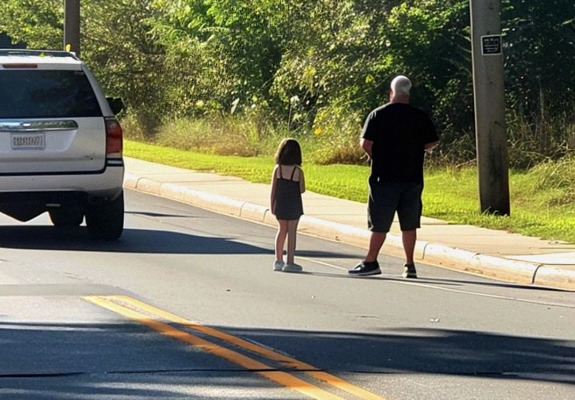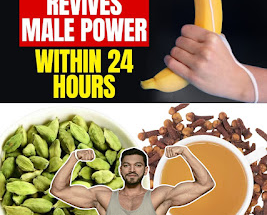There are moments in life that leave scars so deep, even time struggles to heal them. For me, one of those moments came when I was thirteen years old—the day my father drove away and never came back. The sound of his tires screeching on the pavement still echoes in my memory, as if hope itself was crushed beneath the rubber that carried him away. That moment fractured my world, leaving behind unanswered questions, unspoken pain, and a bond between my mother and me that had to withstand the storm of abandonment.
A decade later, fate presented me with an encounter I never could have anticipated: I stopped on the side of the road for a hitchhiker, only to find it was him—my father—holding the hand of a little girl. The same man who had once walked out of my life stood before me, older and weary, but still unmistakably the father I had longed for and resented all at once.
This unexpected reunion unearthed emotions I thought I had buried. Would this encounter bring healing, or would it tear open wounds that had barely begun to scar over?
The Day He Left
The memory of that day is still etched in painful detail. I remember the sun hanging low in the sky, casting long shadows on the driveway as I watched his car turn the corner.
“Dad!” I screamed, running after him, my sneakers slapping against the pavement. “Please, Dad, come back!”
But he didn’t. There was no explanation, no note on the kitchen table, not even a backward glance in the rearview mirror. Just silence where his laughter used to be.
When I turned toward the house, my mother—Crystal—stood in the doorway, her face pale and expression blank, as though her mind couldn’t fully process what had just happened.
“Mom?” I whispered, my voice trembling, so small it barely carried over the quiet evening air.
She blinked rapidly, as if waking from a nightmare, and opened her arms. “Come here, baby. Come to Mama.”
I collapsed against her chest, my face buried in her shirt. It smelled like home—like laundry detergent and the faint scent of vanilla she always wore. She held me tightly, but I felt her trembling beneath the surface.
“Why, Mom?” I sobbed. “Why did Dad leave? What did we do wrong?”
Her hand smoothed my hair, her touch gentle but quivering. “I don’t know, sweetie. I wish I did.”
At that moment, something shifted in me. In the safety of her arms, I made a silent vow: I would be strong for her. Even though I was still a child, I promised myself I wouldn’t let her carry the weight of heartbreak alone.
“We’re going to be okay, Mom,” I said, trying to steady my voice. “We’ve still got each other.”
Tears slipped down her cheeks as she whispered, “Yes, sweetheart. We’ll always have each other.”
Learning to Live Without Him
The years that followed were heavy with challenges. His absence was a constant shadow in our lives. Birthdays felt incomplete, holidays were quieter, and even ordinary days were punctuated by the aching reminder of someone missing at the dinner table.
But somehow, my mother and I survived. More than that—we grew strong. We became a team, two hearts bound together, learning to build a life without the third that had once held us in balance.
about:blank
There were nights when I heard her crying softly behind her bedroom door. There were mornings when I wished I could call him, ask him questions, or just hear his voice. But instead of giving in to despair, we leaned on each other.
My mother worked tirelessly, often sacrificing her own comfort to provide for us. And I, in turn, tried to be her anchor, her reason to smile even when life felt cruel. Slowly, through resilience and love, we built a fragile sense of peace.
I thought the chapter of my father’s absence was permanently closed. But life has a way of reopening doors you thought had been sealed shut.
A Sunset Encounter
It was an ordinary evening when the extraordinary happened. I was driving home from work, the sky painted in streaks of pink and orange as the sun dipped below the horizon. The radio played a pop song about heartbreak, though I wasn’t really listening.
That’s when I saw them.
On the shoulder of the road stood a man and a young girl, her small hand clasped tightly in his. They were hitchhiking, thumbs extended, their silhouettes framed against the fading light. Something about the way the man stood—protective, slightly weary—made my chest tighten.
I slowed down, squinting.
No. It couldn’t be.
But as I pulled closer, recognition slammed into me. My heart began to pound so hard I could hear it in my ears. I parked on the shoulder, my hands trembling on the steering wheel.
They approached my car. The girl skipped lightly, chattering happily, tugging at his hand. And then I saw his face.
It was him. My father.
Recognition
Time had changed him. His once-dark hair was streaked with gray, his face lined with exhaustion. Yet his eyes—the same eyes I saw in my own reflection every morning—were unmistakable.
I stepped out of the car, my knees unsteady. “Do you… need a ride?” I asked, my voice catching, unfamiliar even to my own ears.
He turned toward me, a faint smile beginning to form. But then recognition flashed across his face. The smile faltered, replaced by wide eyes and a silence heavy with shame.
“Ellie?” he whispered. My name fell from his lips like a confession, fragile and full of disbelief.
The Weight of a Decade
In that single word—my name—ten years of absence, silence, and pain came rushing back. I was no longer the little girl chasing after his car; I was a grown woman standing face-to-face with the man who had shaped my childhood through his absence.
A thousand emotions swirled inside me: anger, grief, longing, and an unexpected flicker of hope. I thought about my mother, who had sacrificed everything to keep us afloat. I thought about the nights I had cried myself to sleep, wondering why I wasn’t enough for him to stay. And now here he was—older, changed, with a new child by his side.
Part of me wanted to scream at him. Another part wanted to ask him why. And yet, another part—the little girl who had once run after him—just wanted him to hold me and say he was sorry.
A Journey of Healing
Reunions like these are complicated. They are not the neat, happy endings we see in movies. They are messy, filled with contradictions. Seeing my father again did not erase the years of pain, but it did open a door to something I hadn’t expected: the possibility of understanding.
Forgiveness is not immediate, and wounds that deep do not close overnight. But standing there on the side of the road, I realized that maybe healing wasn’t about erasing the past. Maybe it was about facing it, finally, with the courage to acknowledge the pain and decide whether to let it define me or free me.
Lessons Learned
This encounter taught me a few powerful lessons:
- Abandonment leaves scars, but it does not define your worth. The choices my father made were his own; they did not mean I was unworthy of love.
- Healing is not linear. Even after a decade, the pain resurfaced the moment I saw him. But acknowledging that pain was a step toward growth.
- Family can be rebuilt in unexpected ways. My mother and I became each other’s anchor, proving that love can survive even when someone walks away.
- Forgiveness is a choice, not an obligation. Meeting him again gave me the chance to decide whether to forgive—not for his sake, but for my own peace.
Closing Thoughts
The day my father disappeared, my world lost its color. The day I saw him again, years later, the colors returned—not in the same way, but in a new, more complicated palette.
Life rarely gives us clean resolutions. Instead, it gives us moments—messy, emotional, transformative moments—that shape who we become. My father’s return did not erase the pain of his leaving, but it did give me the chance to confront the questions that had haunted me for years.
As I stood on that roadside, staring into the eyes of the man who had once broken my heart, I realized that healing is not about forgetting. It is about acknowledging the truth, holding space for both pain and love, and choosing, every day, to move forward with strength.
And in that moment, I knew one thing for certain: no matter what happened next, my mother and I would always have each other. And that, in the end, was enough.


